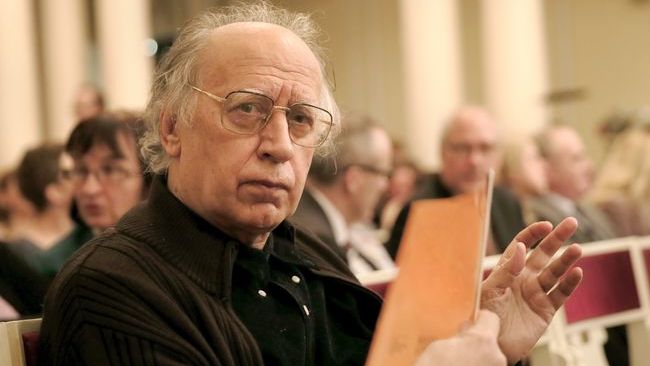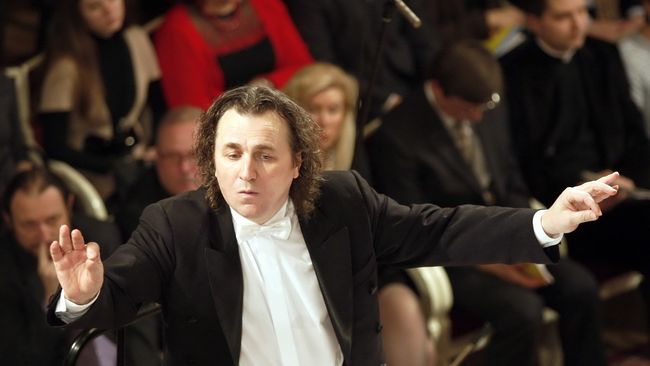Bravo, maestro!
Kyiv saw the world premiere of Valentyn Sylvestrov’s Eighth Symphony
Musicians of the National Symphony Orchestra of Ukraine conducted by Volodymyr Sirenko have presented a feast of music. This concert turned a new brilliant page of the 25th jubilee international festival “Music Premieres of the Season,” which coincided for the second time with Kyiv Day this year. The performance of a renowned team became a gorgeous gift to appreciators of symphony music by such classics as Franz Schubert and Richard Wagner, as well as our contemporaries Myroslav Skoryk and Valentyn Sylvestrov.
Irrespective of the era in which they are created, classical music pieces concentrate eternal images and feelings that can call up a chain of associations and allusions which are well in tune with today and still remain topical, each time surprising the listener with the ability to create a fresh impression. So, Schubert’s Eight (“Incomplete”) Symphony (premiered, incidentally, 150 years ago in Vienna after the composer’s demise), which opened the concert, made the listener sink into the world of complex lyrical, romantic, and sharply diverse psychological conditions of an individual who is aware of a disastrous chasm between his or her serene dreams of a happy future and the dramatic things of real life, the awareness of which may reach the very peaks of a tragedy.
Amazingly, the audience felt the echo of Schubertean symphony’s figurative aura in Sylvestrov’s Eighth Symphony, the world premiere of which Kyiv’s musical community and aficionados of the well-know Ukrainian composer’s oeuvre had long been looking forward to. A certain proximity between Schubert’s and contemporary Ukrainian maestro’s world views could be seen in both composers’ aspiration to thoroughly listen to the musical phrases that were literally vanishing in the hall’s acoustic space. Schubert used this effect of a gradual attenuation of sound vibrations in the finale of his Eighth Symphony. Maybe, the striking dynamic polarization of images and sounds in Sylvestrov’s symphony – from a thunder-like vibration or literally “eruption” of the sound right into the concert hall’s space, which called up certain associations with apocalyptical themes, to celestially serene, tender, and sensitive intonations, almost a childish defenselessness of modulations of the strings and the “porcelain-like” sounds of the piano, which seemed to be hanging in the air – caused many listeners to feel the echo of today’s realities in this post-eschatological sound picture.
In this opus, the composer did not betray his artistic credo – the author’s most sincere and refined expressiveness, immersion in the lowest depths of sound vibrations, free manipulation of sound masses, and relishing every isolated musical sound. The one-part integrated composition seemed to virtually comprise several diverse parts of a traditional classical symphony.
The famous Introduction to Wagner’s opera Lohengrin captivated all those present in the hall with the symphony orchestra’s powerful Wagnerian energy, when the audience was being gradually brought into the state of Tantric and ecstatic admiration, an incredible emotional elation. Conductor Sirenko’s masterly interpretation of the extraordinarily difficult and highly expressive Wagnerian score drew an expected response from the audience which kept the musicians on the stage, giving them a long standing ovation.
The Day asked Kyiv’s well-known musicians – opera and symphony conductor Ivan Hamkalo and composer Hanna Havrylets – about their impressions of the concert.

THE MUSIC FEAST WAS PRESENTED BY MUSICIANS OF THE NATIONAL SYMPHONY ORCHESTRA OF UKRAINE CONDUCTED BY VOLODYMYR SIRENKO AUDIENCES ALWAYS EXPECT SOMETHING NEW AND UNCOMMON FORM MAESTRO VALENTYN SYLVESTROV, AND HIS EIGHTH SYMPHONY BECAME A GIFT TO MUSIC LOVERS
“The concert was wonderful, and I am glad to congratulate maestro Volodymyr Sirenko on such a great and well-deserved success,” Havrylets said. “The very idea and program of the concert are extremely interesting – the latter was clearly structured and performed in a filigree manner. What made an indelible impression on me is the performance of Skoryk’s viola concerto. And, of course, we all looked forward to the premiere of Sylvestrov’s new symphony. It seems to me the past and the present Sylvestrov have merged in this opus. This merger turned out to be amazingly harmonious and natural. Undoubtedly, this work ushers in a new stage in the artist’s oeuvre. All his music colleagues knew that he was always in a creative search, but nobody could guess that it would result in a symphonic opus. Still more surprising for all was the emergence of this monumental symphonic canvas.”
“What struck me was the large number of listeners who packed the hall almost to capacity, although it was (incidentally, for the first time in the festival’s history) a paid concert,” Hamkalo confessed. “The orchestra coped well with a difficult program, and I especially liked the performance of Skoryk’s viola concerto by Valantyna Pryshliak, a superb viola player, a prize winner at international contests in Italy, Slovakia, Germany, and Switzerland, who, after going to the Lviv National Music Academy, graduated from the Yehudi Menuhin International Music Academy and then from the Higher School of Music in Lausanne (Switzerland), and has the experience of playing with the symphony orchestras of Ukraine, Germany, and Switzerland. You may have noticed that her instrument sounds elegant. At times, the impression was that she was playing on one string. The Skoryk concerto is interesting in terms of music and composition, and it should find its place in the repertoire of our soloists because there are not so many concertos of this kind not only in Ukraine, but also in the rest of the world. I also listened with great interest to a new symphony by Sylvestrov from whom everybody expects something new and uncommon. The audience gave a big hand to this large-scale, albeit one-part, symphonic canvas.”
Newspaper output №:
№33, (2015)Section
Culture





